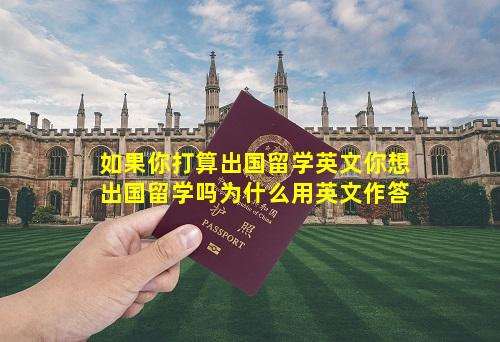 锦泰留学网
锦泰留学网如果你打算出国留学,英文是一门非常重要的技能。下面是一些建议,帮助你准备出国留学英文:
1. 提前准备:在出国留学之前,开始提前学习英文。可以参加英语课程、自学或者找一个外教进行一对一辅导。
2. 培养听力能力:听力是学习英文的重要基础,你可以通过听英文歌曲、看英文电影和电视剧来提高听力水平。在学习过程中使用真实的英语材料,如英文新闻、访谈等也是很有帮助的。
3. 拓宽词汇量:英文词汇量的增加对于有效沟通非常重要。建议使用英文词汇卡片,每天学习一些新的词汇,并尝试将它们运用到日常对话中。
4. 提高口语表达能力:与母语为英文的人交流是学习英文口语最好的方式。你可以找到一个英语角参与练习,或者通过在线语音聊天来与外国人交流。
5. 阅读英文书籍和文章:阅读是学习英文的另一个重要环节。选择适合自己水平的英文书籍或者文章,并逐渐挑战更难的材料。阅读不仅可以帮助你提高词汇量,还可以提高理解能力和写作能力。
6. 学习语法和写作技巧:除了口语能力外,英文的语法和写作技巧也是必不可少的。参加英文写作课程或者阅读相关书籍,可以帮助你了解语法规则和提高写作水平。
7. 创造英文学习环境:在日常生活中创造一个英文学习的环境,比如使用英文手机应用程序、看英文杂志、参加英文电影观影会等等。这样可以让你更加接触到英文,并提高学习兴趣。
记住,学习英文是一个持续的过程,需要坚持和努力。通过利用各种学习资源和与英文为母语的人交流,你将能够更好地适应在国外留学的环境中使用英文。

Yes, I would like to study abroad. There are several reasons why I want to pursue my education in a foreign country.
Firstly, studying abroad would provide me with a valuable opportunity to immerse myself in a different culture and experience a new way of life. I believe that exposure to diverse cultures and perspectives can broaden my horizons and help me develop a more global mindset. By living and studying in a foreign country, I would be able to interact with people from different backgrounds and learn from their experiences.
Secondly, studying abroad would offer me access to high-quality education and resources that may not be available in my home country. Many renowned universities and colleges worldwide offer exceptional academic programs and cutting-edge research opportunities. By studying in a foreign institution, I would have the chance to learn from top-notch professors, engage in innovative research projects, and gain exposure to advanced learning methodologies.
Furthermore, studying abroad would enhance my language skills. Immersing myself in a country where the primary language is different from my own would provide me with the perfect environment to improve my language proficiency. Fluency in multiple languages can be advantageous in my future career and open doors to global job opportunities.
Lastly, studying abroad would allow me to foster independence, resilience, and adaptability. Living in a foreign country away from the support systems and familiar surroundings would challenge me to step out of my comfort zone and become self-reliant. It would enable me to develop crucial life skills like problem-solving, effective communication, and cross-cultural understanding, which are highly valued in today's increasingly globalized world.
In conclusion, studying abroad represents an exciting opportunity for personal growth, academic development, and cross-cultural exchange. It would provide me with valuable experiences, expand my knowledge, and prepare me for future challenges. Overall, I believe studying abroad would be a transformative and enriching experience that can positively impact my life and future career.
A: Have you ever thought about studying abroad?
B: Yes, I have actually. It seems like such an amazing opportunity to experience a different culture and gain a higher quality education.
A: That's true, studying abroad definitely opens up a whole new world of possibilities. You get to meet people from all over the world and build a global network of friends.
B: Absolutely. Plus, you have the chance to become independent and develop valuable skills like adaptability and resilience. Being in a different country forces you to step out of your comfort zone and find your own way.
A: That's a great point. Living in a foreign country can be challenging, but it also helps to enhance your personal growth. You learn to navigate different cultural norms and become more culturally competent.
B: On the other hand, studying abroad can be quite expensive. Tuition fees, living expenses, and travel costs all add up. It's important to consider the financial aspect and whether it aligns with one's budget.
A: Yes, budgeting is definitely a crucial factor. It's also important to consider the distance from home. Being away from family and friends for an extended period can be challenging for some people.
B: That's true. Homesickness can be a real struggle for some students. It's important to have a support system in place and stay connected to loved ones back home.
A: Another potential downside is the language barrier. If you choose to study in a country where the primary language is different, it can be difficult to fully immerse yourself and make the most out of the experience.
B: Yes, language barriers can sometimes hinder communication and understanding. However, it can also serve as a motivation to learn a new language and improve language skills.
A: Overall, studying abroad has its advantages and disadvantages. It's important to weigh the benefits against the potential challenges and make an informed decision based on individual goals and circumstances.
B: Absolutely. It's a decision that can greatly impact one's academic and personal growth. Doing thorough research and seeking advice from people who have gone through the experience can help in making the right choice.
There are several reasons why people choose to study abroad. Firstly, studying abroad provides an opportunity to broaden one's horizons and gain a global perspective. It allows individuals to immerse themselves in a different culture, language, and way of life, which can contribute to personal growth and development.
Secondly, studying abroad often offers access to high-quality education and research opportunities that may not be available in one's home country. Many renowned universities and colleges around the world are known for their expertise in specific fields and offer cutting-edge programs and facilities, attracting students from all corners of the globe.
Thirdly, studying abroad can enhance career prospects. Employers often value the skills and experiences gained through studying abroad, such as adaptability, intercultural competency, and language proficiency. Studying in a foreign country can also provide networking opportunities and a chance to build international connections, which can be valuable in an increasingly globalized job market.
Lastly, studying abroad allows individuals to step out of their comfort zones and challenge themselves in new and unfamiliar environments. It provides an opportunity to become more independent, self-reliant, and confident. Living and studying in a foreign country can foster personal and academic growth, as individuals learn to navigate through different cultural norms, overcome language barriers, and adapt to new surroundings.
Overall, studying abroad offers a unique opportunity for personal and academic development, access to high-quality education, improved career prospects, and a chance for individuals to immerse themselves in new cultures and experiences.